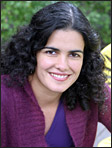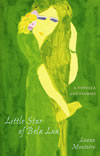No Ordinary Fish Tale: Luana Monteiro Discusses Little Star of Bela Lua
 Luana Monteiro |
Delphinium Books Editorial Director Barbara Ascher knew she was onto something great when she started reading the manuscript of Luana Monteiro's debut book, Little Star of Bela Lua. The book's whimsical novella of the same title -- set in a poor desert town in Monteiro's native Brazil -- begins: "No one remembers exactly when or how the fish, that bizarre and calamitous creature, with its strange smile and fins of foreign colors, arrived in Jatob. No one except Otlia Ermerentino, whose life it changed forever."
"I read those first two sentences and thought, 'This is something quite special,'" Ascher said. "And, as I'm sure you know, the number of times something that special comes across your desk is, sadly, rare! The other extraordinary thing is that the book was written in English, which isn't her first language. And she writes in English like a born poet."
 Independent booksellers agreed. Little Star of Bela Lua was a September Book Sense Pick. Among its fans was DeDe Teeters, Armchair Books, Port Orchard, Washington, who said, "I loved this collection of haunting, mystical stories set in rural Brazil. Each one was so different and yet connected -- it was a pleasure to savor them all!"
Independent booksellers agreed. Little Star of Bela Lua was a September Book Sense Pick. Among its fans was DeDe Teeters, Armchair Books, Port Orchard, Washington, who said, "I loved this collection of haunting, mystical stories set in rural Brazil. Each one was so different and yet connected -- it was a pleasure to savor them all!"
Monteiro, 28, also writes with "great, great mature wisdom," Ascher said. "When I read the manuscript, and there were no photos of her, obviously, I thought she was a much, older woman. So, I was stunned to learn that she was a beautiful, very young woman."
Like the novella, the fish Otalia discovers is also quite special. During its stay, blind people and others who are handicapped suddenly become cured, and other miracles happen.
In an interview with BTW, Monteiro said the miracles that occur in the novella are made possible by Otalia's perception of the fish, "because she thinks of it as a miraculous being." Monteiro's fish is also an outsider. In the arid Serto region of Brazil, Monteiro observed, "fish are very foreign creatures." But according to folklore, the Serto wasn't always a desert. "Legend goes that the place was actually an ocean not too long ago," the author said.
Monteiro knows the characters in her book well. Bela Lua, which also contains three fanciful short stories, "has everything to do with her experiences as a child in Brazil," Ascher commented. "These were the stories she heard. I asked her if she had met most of the characters in the book, and she answered 'all of them.'" Monteiro, who grew up in Refice on the northeastern coast of Brazil, and who later moved to the U.S. with her family, would spend weekends in the remote, dusty town of Camaragibe. She would lodge in a hut, where the only source of entertainment was storytelling -- and the stories were often fantastical.
But while some of the characters in Little Star of Bela Luna, were drawn from stories Monteiro has known, others were based on real people close to her. In the story "Curado," a doctor who cares for a defecating turkey that a patient has given him ultimately finds that rural traditions get him into trouble. The doctor in the story was modeled after Monteiro's own father, Dr. Alberto Monteiro, a surgeon. "Like the doctor in the story, my father learned to do many things in addition to medicine -- whatever the need asked for. And my father is also a storyteller like the character."
And when she was coming up with the sexually conflicted priest in another story, Monteiro conducted research by speaking with "the priest who baptized me," she noted. "He was very useful when I was researching the character, because he's an activist and he's had to battle with a few devils himself."
There are several points in Bela Lua where Monteiro's characters search for, and find, God. "They're all searching for something inside, fulfilling a certain emptiness," she explained. Monteiro isn't "religious" but she does consider herself spiritual. "I've been practicing certain meditations for 10 years through Sant Mat." In fact, she and her husband, Francisco Martinez -- who were married on August 7 -- share the same spiritual path. "We were recently at a retreat in the Umpqua River Valley in Oregon, and our teacher, Sant Baljit Singh, gave us our marriage blessing."
Meanwhile, Monteiro believes she needs to become even more spiritual. "As that happens, I hope it will influence my writing in some way," she said. "I just hope that it won't make me stop writing altogether, because you kind of write from the need to fulfill something too."
Currently, Monteiro's ''already working on her next book, a novel that explores many of the themes touched upon in her short stories. "When you have real spiritual fulfillment, and all your needs are fulfilled, then you might not feel the need to do certain things anymore. But we'll see." -- Jeff Perlah

